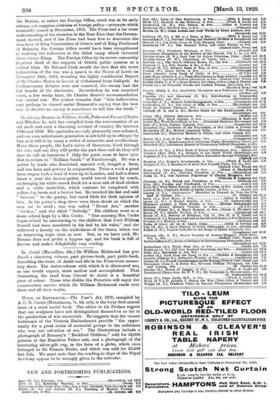Mr. George Bourne in William Smith,Potteraral Farmer (Chatto and Windus,
6s. net) has compiled from the conversation of an old uncle and aunt a charming account of country life between 1790 and 1858. His spectacles are only pleasantly rose-coloured, and our own unfortunate generation is not held up to obloquy by him as it still is by many a writer of memories and recollections. Have these people, the Lot's wives of literature, lived through the war, and can they still prefer the past time and do they still dare to call us luxurious I Only the poets seem to have eyes. But to return to " William Smith " of Farnborough. He was a potter by trade who flourished, married well, bought a farm, and ran farm and pottery in conjunction. Twice a week a great farm wagon took a load of ware up to London, and half-a-dozen times a year the farmer-potter would travel there by coach, exchanging his white smock frock for a neat suit of drab clothes and a white neckcloth, which costume he completed with yellow-top boots and a beaver hat. He touched his hat and said " Sarvent " to the gentry, but cared little for their opinion of him. In his potter's shop there were three stools on which the men sat to work ; one was called " Broad Ass," another " Cockey," and the third " Nobody." His children went to a dame school kept by a Mrs. Cooke. " One morning Mrs. Cooke began school by announcing to the children that Lord William Russell had been murdered in his bed by his valet," and she delivered a homily on the wickedness of the times, which was an improving topic then as now. But, as we have said, Mr. Bourne does not prefer a bygone age, and his book is full of flavour and makes delightfully easy reading.










































 Previous page
Previous page